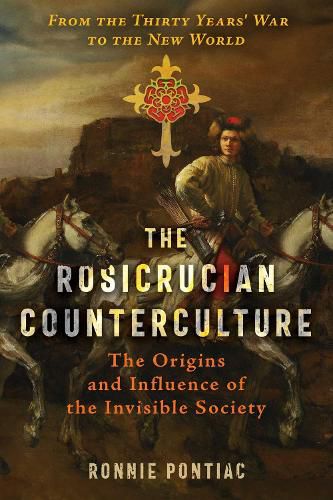Readings Newsletter
Become a Readings Member to make your shopping experience even easier.
Sign in or sign up for free!
You’re not far away from qualifying for FREE standard shipping within Australia
You’ve qualified for FREE standard shipping within Australia
The cart is loading…






A cultural exploration of the esoteric movement and its historical impact and legacy
Examines the Rosicrucian involvement of figures like Rene Descartes, Robert Fludd, John Dee, Elias Ashmole, and the alchemist pirate Prince Rupert of the Rhine
Traces the saga of Rudolf II, Holy Roman Emperor, and his countercultural successors Frederick and Elizabeth, who triggered the Thirty Years' War
Shows how Rosicrucianism inspired the English Revolution and explores the Rosicrucianism of John Winthrop the Younger, Connecticut's founder
Since the appearance of Rosicrucian manuscripts in 17th-century Germany, historians have questioned the authorship, intent, and significance of this esoteric movement. In this book, Ronnie Pontiac shows how Rosicrucianism's underground influence in the early-modern period continues to the present, providing the important historical context of this invisible society.
Pontiac looks at the esoteric culture around Holy Roman Emperor Rudolf II and his court, including figures like John Dee, Tycho Brahe, and Rabbi Loew, the legendary creator of the Golem of Prague. Despite occultists' fascination with Rudolf 's successors, Frederick and Elizabeth, at the start of the Thirty Years' War-and Rosicrucian efforts to make Frederick the first Protestant Holy Roman Emperor-the esoteric renaissance in Bohemia was short-lived. However, this wasn't the end of Rosicrucianism.
Pontiac explores the movement's impact on Oliver Cromwell and the English Revolution as well as individuals such as Robert Fludd, Rene Descartes, Elias Ashmole, Moritz the Learned, Paracelsus, and William Shakespeare. He then details the movement's arrival in the New World, including the Rosicrucian activities of Connecticut's alchemist governor, John Winthrop the Younger. Looking to the present, Pontiac shows how both pop culture and the modern psychedelic counterculture are informed by Rosicrucian ideas, showing the enduring legacy of this esoteric movement.
$9.00 standard shipping within Australia
FREE standard shipping within Australia for orders over $100.00
Express & International shipping calculated at checkout
Stock availability can be subject to change without notice. We recommend calling the shop or contacting our online team to check availability of low stock items. Please see our Shopping Online page for more details.
A cultural exploration of the esoteric movement and its historical impact and legacy
Examines the Rosicrucian involvement of figures like Rene Descartes, Robert Fludd, John Dee, Elias Ashmole, and the alchemist pirate Prince Rupert of the Rhine
Traces the saga of Rudolf II, Holy Roman Emperor, and his countercultural successors Frederick and Elizabeth, who triggered the Thirty Years' War
Shows how Rosicrucianism inspired the English Revolution and explores the Rosicrucianism of John Winthrop the Younger, Connecticut's founder
Since the appearance of Rosicrucian manuscripts in 17th-century Germany, historians have questioned the authorship, intent, and significance of this esoteric movement. In this book, Ronnie Pontiac shows how Rosicrucianism's underground influence in the early-modern period continues to the present, providing the important historical context of this invisible society.
Pontiac looks at the esoteric culture around Holy Roman Emperor Rudolf II and his court, including figures like John Dee, Tycho Brahe, and Rabbi Loew, the legendary creator of the Golem of Prague. Despite occultists' fascination with Rudolf 's successors, Frederick and Elizabeth, at the start of the Thirty Years' War-and Rosicrucian efforts to make Frederick the first Protestant Holy Roman Emperor-the esoteric renaissance in Bohemia was short-lived. However, this wasn't the end of Rosicrucianism.
Pontiac explores the movement's impact on Oliver Cromwell and the English Revolution as well as individuals such as Robert Fludd, Rene Descartes, Elias Ashmole, Moritz the Learned, Paracelsus, and William Shakespeare. He then details the movement's arrival in the New World, including the Rosicrucian activities of Connecticut's alchemist governor, John Winthrop the Younger. Looking to the present, Pontiac shows how both pop culture and the modern psychedelic counterculture are informed by Rosicrucian ideas, showing the enduring legacy of this esoteric movement.